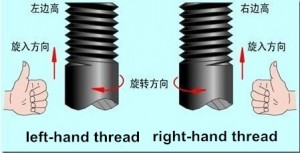LEFT-HAND THREAD AND RIGHT-HAND THREAD
There are two types of threads:
left-hand thread and right-hand thread.
When the part is placed vertically along the axis, when the left end of the thread helix is higher than the right end, it is a left-hand thread (as picture). When the right-hand thread is higher than the left-hand thread, it is a right-hand thread.

Discrimination method:
1. Hand twist
The thread that is screwed in when rotating counterclockwise is called a left-handed thread, on the contrary, the thread that is screwed in when it is turned clockwise is called a right-handed thread.
2. Observation
Place the thread vertically along the axis, you can see that the thread has a certain inclination angle. If the left is higher than the right, it is a left-hand thread. When the right is higher than the left, it is a right-hand thread.
3. The left-hand rule
Since most threads are right-handed, the right-hand rule method is introduced first.
Right-hand thread:
In accordance with the right-hand rule, make a fist with your right hand, point the thumb of your right hand in the direction of movement of the screw, and the other four fingers point to the direction of rotation of the screw. Tightening the right-hand screw (especially the screw) is suitable for the physiological characteristics of the right hand, so it is implemented as a standard specification. Common screws and bolts, if not specified, are all right-handed.
Left-handed thread:
in accordance with the left-hand rule, the method is similar to the right-hand rule. Make a fist with the left hand, point the thumb of the left hand in the direction of movement of the screw, and the remaining four fingers point to the direction of rotation of the screw.
Processing methodedit
There are two main methods for machining left-hand threads: spindle reverse machining and spindle forward machining.
Spindle reversal machining method
Spindle reverse machining
the spindle is reversed, and the tool cuts threads from right to left.
Spindle forward machining method
the spindle rotates forward, and the tool cuts threads from left to right. [2]
.